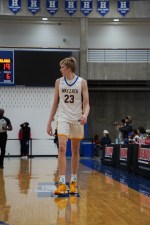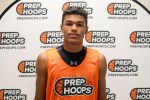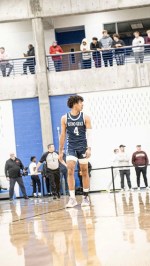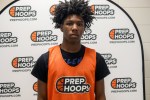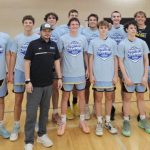“The adversity never stops” — Minneapolis Edison basketball
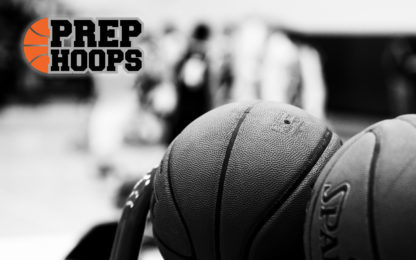

Photos: Alex Conover, Breakdown USA, Steve Kotvis f/go
Historical statistics: Jeffrey Buszta
Edison basketball has never been very good. Not since I can remember, or since anyone can remember, really.
In fact, they’ve been especially bad lately. In the last 10 years, the Tommies have won just 51 games. That’s a very poor average of about five wins per year. At one point, you could have made a strong case for it being the worst coaching job in the entire state.
But something is very different this season. The Tommies are 17-9 under second-year coach Ahmil Jihad. This is the most games they have won since 1964–1965 — 54 years ago.
Edison basketball should be elated by this truly historical improvement. But instead, this last weekend was nothing but tears. They buried Abdi Wasa Farah, an 11th grader who was known for his jump shot and sense of humor.
Thomas Edison High School is on Monroe St. NE and 22nd Ave NE, northeast of Sikora’s Polish Market and south of the Dairy Queen on Lowry. It’s the only public school in Northeast Minneapolis, and the student body is a very diverse blend. As far as sports, the school has been good at football and wrestling in the past. Teams elsewhere in the city knew Edison as having big, tough, Polish kids on the offensive line and skating on the ice in the 1970s and 80s. Baseball has been good lately as well as girls’ track, but never the basketball team.
How bad has the drought been? So bad that the last time they had a winning record was more than 50 years ago. Think about how long ago 1965 is. I’d be hard pressed to find a longer drought in the entire state.
Somewhere in the last 10-15 years, things got truly dreadful. The Tommies only won a handful of games each year, coaches didn’t last more than a season, and they had become an automatic win on every opponent’s schedule.
Jackson Rusnacko is a senior on this year’s team. He recalls his freshman year when things were truly as bad as they could get, when the Tommies went 1-26.
“Freshman year, we were doing so badly that finally one day our athletic director called me and three other players into the office along with our coach,” he said. “He strongly recommended we cancel the rest of our varsity season and just play JV because of how rough the season was going. We ended up forfeiting the rest of that season and not taking place in sections at all.
“When I started freshman year, we had 12 freshman that went out for basketball. Out of those 12, I’m the only one left on the team.”

The Edison coaching job was open again before last season, and Ahmil Jihad wanted the gig. Many others — inside and outside the building — regarded it as a deeply difficult position.
“They told me I was going to have my hands full,” Jihad said. “When I was sitting in the interview, they asked, ‘are you up for this? Or are you another one who will be out the door in a year or two?’ I said I was invested. I’m from North. They said the only positive thing out of that school lately were the girls winning state in track. There aren’t any banners for basketball. Well, here’s a chance for 17 guys to rewrite history.”
Last year led to five wins. A post-game skirmish involving conference foe Washburn (and eventually the police) resulted in suspensions for several players and put a large damper on the season.
This year, right before tryouts, a few key additions added to a modest core of Rusnacko, Farah, Jermaine Cornell and others assembled a suddenly decent unit. Add this to the JV guys running all offseason, whether it was around the lakes or with the track team.
Antonio Simmons is a strong two-sport athlete who transferred from North. They also added homeschooled 7th grader Hanif Muhammed, a cerebral shooter who, although quite young, is described by Jihad as a significant piece of the program’s success. Tenzin Oden followed his cousin to Edison from Irondale, bringing a shooting presence. And sophomore point guard Jeremiah Thompson simply showed up to the school from Chicago, seemingly out of nowhere.
“We do open runs and a lot of guys come in and workout three times a week,” Jihad said. “Neither one of them (Simmons nor Thompson) did fall league. In fact, Jeremiah showed up at Edison a few weeks before tryouts. He’s been a good addition and he’s only a sophomore.”
Things were promising early on, with wins coming about every other contest.
Then, Edison went on a seven-game winning streak. For a school that was so thirsty for success after decades of struggle, the community lit up. Since then, the Tommies have swept conference opponents Southwest, Washburn, South and Roosevelt.
“We used to get maybe 20 people at our games,” Rusnacko said. “Now it’s more like 200. All the teachers are talking to us every time after a game, asking how it went or talking about how good we did or what they think we should improve on. Students are talking about games all day in school on game day saying ‘you guys are gonna go crazy tonight’ and other encouraging stuff. The basketball season has given all the students and staff a common thing to be proud of with Edison.”
This leads to the natural question: what has been the difference that sparked this dramatic turnaround?
“It’s the right mix of kids and them accepting their roles, playing within the system,” Jihad said. “Trying to move as a unit. Our biggest thing is family first. We push that whole thing, what’s a good teammate, how can you be a good teammate, because nobody’s ever really put that stuff on the table with these guys.”
Jihad had to reconstruct many of the players’ basketball IQ nearly from the ground up. And once they started seeing results, they bought in quickly.

“We had to go back to basketball 101, for instance why it’s not good to run down and shoot an NBA three,” Jihad added. “People really understand their roles now, and guys watch tape on their phones on the bus.”
Rusnacko had similar sentiments.
“We had no structure before,” he said. “Players were allowed to do and say what they wanted without repercussion, and now there is a sense of respect for each other, the coaching staff and the school, which I believe has turned the culture at Edison into a winning program. Also, I believe that the level of accountability we are being held to is helping keep players academically eligible and continuing sports.”
Abdi Wasa Farah was a part of the turnaround for a while. He was a promising piece for Jihad and the Tommies last year, proving his shooting ability as a sophomore. Although he had transferred to Heritage Academy as a junior, he still played with Edison since the schools co-op together. He was chosen as one of three returning Tommies to take part in the Breakdown USA photo shoot prior to the season.
He was around less and less as the season progressed. He was missing practice, telling teammates that he had to work. Then, he stopped showing up altogether.

On March 1, a 17-year-old was shot and killed in the Cedar-Riverside neighborhood, according to Minneapolis Police Department’s early reports. By Saturday morning, it had been confirmed by family that it was Farah.
“We talked about it Saturday at 10 A.M. practice, that two of the kids at Heritage had confirmed it,” Jihad said. “People were really shocked and took it really hard. Kids were really struggling with it, you could tell that guys wanted to go home.
“He was one of our starters last year, he was a huge contributor. He was a jokester and always brought positive energy to practice. All good memories with that guy.”
It was the second loss in about two months for Jihad. Just before the new year, his father passed away. And true to form, for a program that talks about family first, the players were there to support.
“When my dad passed away in December, it took a huge lump out of me,” Jihad said. “The guys supported me. We had 16 Edison players at the funeral. I ended up coaching the PACT Charter game right afterwards, and the kids said that the win was all for me. We’ve dealt with a lot of adversity.”
We’re told by somebody — parents, coaches, elders — that facing challenges “builds character,” or something like that. In a world where kids get discouraged and transfer at what seems to be minor inconveniences, it’s hard to imagine the trials that someone like Rusnacko has gone through as an Edison football and basketball athlete.
“During my sophomore football season, we got beat by 40+ points in six games,” said Rusnacko. “I do believe it made me tougher going through that. It’s way easier coming into a winning program and playing a small role in it and contributing to the norm at a school like DeLaSalle… when you come into a program like Edison where the norm is losing and there is no winning culture — and you’re trying to be one of the main kids that turns a program around and shifting from a losing program to a winning program — it’s a struggle.

“I am very glad I came to Edison and had the opportunity to do this. I can honestly say that if I had a chance to go back and choose between Edison or DeLaSalle, or Hopkins or somewhere like that, I would come to Edison and do it all over again.”
Rusnacko’s hoops career isn’t over yet. The Tommies have a bye in their section before playing Trinity on Saturday. If they win there, they go on to play Minnehaha Academy, a program that is largely expected to steamroll Class AA en route to a state title.
The Tommies will head into sections with Abdi Wasa Farah on their minds. And they will try to keep defying expectations. After all, absolutely nobody expected their season would unfold like this — both the highs and lows.
“We’ve still got a chance to roll the dice and get a couple more wins,” Jihad said. “Hopefully we can keep things going. Minnehaha would be a tall order, but as coaches we need to put our heads together and come up with a game plan.
“The adversity never stops.”




